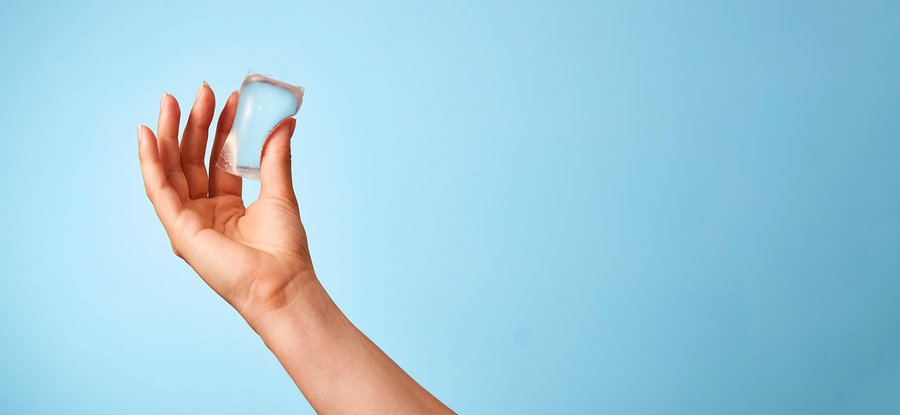
Key details
Date
- 23 October 2023
Author
- Lisa Pierre
Read time
- 10 minutes
Rodrigo Garcia Gonzalez and Pierre-Yves Paslier are the Co-founders of Notpla. They met while studying MA/MSc Innovation Design Engineering at Imperial College London and the Royal College of Art (2014).
After their first video of an edible bubble encapsulating water went viral, they collaborated with chemists and chemical engineers from Imperial College to develop their first product, Ooho.
Ooho won the SustainRCA prize in 2014 and shortly after they were accepted in the ClimateKIC accelerator based in Imperial College incubator and received an EU grant to start the company.
In 2019 the brand Notpla was born, an abbreviation of ‘not plastic’, accompanied by an identity and brand strategy that better represents their mission to make packaging disappear. With a portfolio of advanced, all-natural packaging solutions made from seaweed and plants, the packaging is naturally biodegradable and home-compostable, just like a piece of fruit.
Each product responds to a specific plastic problem as identified across multiple industries, from electronics, fashion, and cosmetics to food. Notpla innovates along the manufacturing chain, developing materials, proprietary manufacturing machines, techniques, and novel formats and designs of consumer products.
In 2023 Notpla was announced as a Grand Prize winner of the Tom Ford Plastic Innovation Prize and in 2022 won the £1m Earthshot Prize, in the category ‘Build a Waste-Free World’, The seaweed paper produced by Notpla also was finalist of the RCA inaugural Terra Carta competition.

Pierre-Yves Paslier and Rodrigo Garcia Gonzalez, co-founders and co-CEOs of Notpla
“Having a background in design allowed us to approach packaging from a user-centre perspective and focus on creating a seamless experience for consumers. The ability to invent was very useful to push ourselves to come up with fresh and innovative solutions not only in terms of our product but also in relation to the processes and the engineering skills were helpful for scaling up and thinking in the long-term to create manufacturing and production ecosystems.”
Co-founders and co-CEOs of Notpla
Do we still have a problem with plastic usage? What do you think is currently the biggest factor to this?
The world absolutely still has a major problem with plastic usage and waste. Plastics are inexpensive, lightweight and durable, which has led to a massive increase in their production over the past several decades. However, plastic waste is not biodegradable and too much of it ends up polluting our oceans and natural environments.
In our view, the biggest factor contributing to plastic waste is the prevalence of single-use plastics - things like plastic bags, straws, food packaging, and water bottles that are used once and then discarded. These single-use plastics make up a massive portion of the plastic waste generated globally each year. Their disposable nature means many of them are quickly littered or escape waste management systems, and viable alternatives to single-use plastics have been slow to catch on due to factors like consumer habits and higher upfront costs compared to plastic.
Tackling single-use plastics is critical to addressing the global plastic crisis. At Notpla, we're pioneering plant-based packaging and other products that provide an effective, scalable and sustainable alternative to many common single-use plastics. Our solutions are biodegradable and home compostable, breaking down within 4-6 weeks. We aim to make packaging disappear and reduce society's reliance on plastic. There is still much work to be done, but we believe plant-based innovations like ours are an important part of the worldwide effort to eliminate plastic waste.
Do you think there have been substantive changes within industry regarding the use of plastics in product packaging or do you think we still have a long way to go?
There have been some positive shifts in industry towards reducing plastic packaging waste, but overall we believe there is still a very long way to go. Some brands are pledging to increase recycled content and invest in recyclable packaging. There is more awareness among consumers, prompting companies to make sustainability commitments. However, these are small steps when we consider the vast scale of the plastics crisis.
Big systemic changes are still required for whole industries to move away from plastic. The latest data shows plastic production is continuing to grow exponentially. Plastics are deeply ingrained into global supply chains and daily life due to their functionality, low cost and light weight. It will take bold action and innovative thinking to transition to a low plastic economy. Brands need to re-evaluate materials from the ground up and governments need to provide regulatory incentives.
At Notpla, we are optimistic about the future but realistic about the size of the challenge. To truly tackle plastic waste will require fundamental changes in how we produce, consume and dispose of materials. It will also take open collaboration between companies, citizens, NGOs and policymakers. We believe a world without unnecessary plastic packaging is possible, but the scale of intervention needed is immense. In that context, Notpla exists to catalyse and accelerate this transition. While there is growing momentum, we have a long journey ahead to build a circular economy free from plastic pollution.

Is there an item of plastic waste you would most like to see eliminated?
There are a lot of items that would be great to eliminate like single-use plastic bags and bottles, but our next big target is the cardboard cups. Not many people realise that these cups have a coating of plastic to make them resist the heat and moisture of the coffee, tea and other hot drinks. This plastic film makes them hard to recycle and even though they are only used for just a few minutes, the plastic lining can persist in the environment for hundreds of years and easily become litter that ends up in waterways and oceans.
We see a lot of potential is doing something similar that we have done with our takeaway boxes to replace the lining. It would be great to have cardboard cups that are lined with seaweed and are fully biodegradable and home-compostable.
How have things changed for Notpla since winning the Earthshot Prize?
Winning The Earthshot Prize has been transformative for our business. We’ve established commercial relationships with some of the giants of the industry, our production has expanded, and we’ve added key hires to our team in order to help us accelerate our impact in restoring the health of our planet.
With the £1 million, we also invest in new machinery to accelerate the injection moulding technology Prince William tested during his visit in May 2023.
Do you feel that there are certain parts of the world that suffer more due to single-use plastic?
The impact of single-use plastic pollution is not uniform across the globe, and it's true that certain regions are disproportionately affected. The severity of the issue is often exacerbated in areas with limited waste infrastructure and less stringent environmental regulations. For example, many developing nations face significant challenges when it comes to managing plastic waste and at the same time it is more difficult for them to find cheap alternatives.
Also, plastic waste that enters rivers and oceans can wash up on shores, impacting local ecosystems and economies dependent on tourism and fishing in coastal areas. Or in small island nations, plastic pollution is a challenge as it is harder to manage waste due to their isolation and limited resources.
There are also new challenges such as microplastics, for instance, that have been found in the Arctic and Antarctic which shows how serious the problem really is.
We know that there is not one solution to solve this issue and we need to tackle the problem on multiple fronts from developing sustainable alternatives to single-use plastics to improving waste management infrastructure and addressing the policy issues. At the end of the day, the fight against plastic pollution is a shared responsibility that requires collective action to restore the health of our planet.
How did the idea to use seaweed come about?
The idea for Notpla originated from our desire to find an innovative solution to tackle the global plastic pollution crisis. For a student project, we set ourselves the challenge of developing completely natural and biodegradable packaging that could replace single-use plastics.
We took inspiration from nature and fruit peel, which is a form of natural packaging that biodegrades. After exploring different natural ingredients and techniques used in the food industry, we had a breakthrough moment with seaweed extracts. Using a culinary spherification technique, we created a viscous seaweed solution that could be shaped into small, transparent bubbles to encapsulate liquids. Although the early prototypes were imperfect, the amazing viral reaction to our idea online convinced us to continue developing it after graduating.
In short, we noticed that the material properties of seaweed allowed it to encapsulate its liquid contents in the ocean without the need for an artificial container. This inspired us to explore whether seaweed could be used to create packaging.

Notpla - Tom Ford Plastic Innovation Prize Winners
Is the seaweed supply chain big enough to sustain your business?
Absolutely - seaweed is one of the planet's most renewable resources!
We source seaweed from a variety of suppliers globally, but focus on working with European partners as much as possible to reduce our footprint. As seaweed farming expands rapidly in Europe, we are together building strong relationships with farms in countries like France, Netherlands, Spain, Norway and our home base in the UK.
One of our current UK seaweed partners is Câr-Y-Môr, a community-owned seaweed farm in Wales growing kelps and other species sustainably. We are confident that with responsible farming practices, the seaweed industry can scale up to meet global demand without depleting wild seaweed populations.
In 5 years, we predict the European seaweed industry will be thriving. Seaweed cultivation is still in its early days in most of Europe, but organisations like Seaweed for Europe or the Global Seaweed Coalition are actively supporting expansion of the sector. The economic and environmental benefits are enormous - seaweed farming revitalises marine ecosystems, sequesters carbon, and creates "blue jobs" in coastal communities. With greater investment and infrastructure, European seaweed production could grow 10-fold in the next 5 years. Notpla aims to support this growth as co-founders by providing a market for seaweed and its extracts as a sustainable packaging material
Between you as the founders of Notpla you embody the skills of a designer, architect, inventor and engineer. Have you found all these skills have helped in your creative and technological approach to your products?
It has definitely helped having backgrounds in different fields.
Having a background in design allowed us to approach packaging from a user-centre perspective and focus on creating a seamless experience for consumers. The ability to invent was very useful to push ourselves to come up with fresh and innovative solutions not only in terms of our product but also in relation to the processes and the engineering skills were helpful for scaling up and thinking in the long-term to create manufacturing and production ecosystems.
That being said, we have been very lucky from the very beginning to have a team that also brought a wide range of abilities, experience and motivation to the Notpla journey. We couldn’t have come this far without their help and we are very grateful for that.
Collaboration is as much at the heart of Notpla as the solutions we design.
The United Nations has declared the plastic pollution of oceans “a planetary crisis” because so much food packaging (especially plastic) has ended up in oceans. Can we really find a solution for a life without plastic packaging?
We have to believe it's possible if we want to drive real change. If there is a will, there is a way!
In 2014, we officially founded the company Notpla, which stands for "not plastic." Since those early days making seaweed bubbles in our kitchen, Notpla has grown tremendously. We now have a team of over 70 people, including chemists, engineers and designers. Our range of products has expanded from the iconic Ooho edible bubbles to takeaway food boxes, flexible films, paper and more, all using seaweed as a key ingredient. It's been an incredible journey so far creating packaging designed to disappear and reduce society's reliance on single-use plastics.
Notpla exists to make packaging disappear - we're proving viable, scalable alternatives to plastic are within reach. But it requires reimagining systems across industries.
“While we have made a breakthrough with our seaweed-based Notpla material, we want to continue innovating and developing new plant-based materials and packaging formats.”
Co-founders and co-CEOs of Notpla
Your 2023 forecast for plastic avoided by Notpla is 27.6t. Are you on target to meet that goal?
We've had a few setbacks but we are still working towards this target.
The adoption of our products, especially our take-away boxes, is growing rapidly as more businesses join the movement to eliminate plastic, but there is a lot of work to be done to educate the public. However, we have very recently received a key regulatory approval - the Dutch Environment Authority (ILT) has confirmed that our coated packaging does not qualify as plastic under the EU Single-Use Plastics Directive.
This conclusion came after a rigorous 9-month evaluation process by ILT and it certifies that Notpla's coated boxes will not be subject to upcoming bans or taxes on disposable plastic food packaging in the Netherlands.
This is a massive win for Notpla and we are hoping that it will give us an additional push in the European market to put us back on track to reach the target.

Notpla Rigid Cutlery
Could you tell us about the new materials you are making from Notpla waste?
At Notpla, we are always looking for innovative ways to turn our waste streams into useful new materials. Our primary packaging solution, Oohos, are made from seaweed and plants and are naturally biodegradable in 4-6 weeks. However, there are fibers and residue left over from the industrial process of extracting seaweed gel that we strive to utilise.
We have now developed a rigid felt material made entirely from these leftover seaweed fibres. By combining them with a natural binder, we can create sturdy sheets that are mouldable while wet. Once dried, the material has a texture similar to wood or plastic. We are testing uses such as furniture, interior design pieces, and general rigid packaging.
Upcycling our own waste stream to create this novel material helps move us closer to a circular production system. And it transforms what would normally be discarded into a reusable good. We're excited by the potential of this seaweed felt to replace less sustainable materials across many applications.
Presently your global reach is 6 markets, 519 restaurants and has served over 500,000 takeaways - what are your plans for the future?
Looking ahead, our strategy is to scale up across Europe, launch in the US market, and eventually expand our presence to Asia. We aim to partner with major consumer packaged goods brands, retail chains, and quick service restaurant chains to replace billions of single-use plastic units with our sustainable alternatives. We are also always thinking about growing our product portfolio and technology. While we have made a breakthrough with our seaweed-based Notpla material, we want to continue innovating and developing new plant-based materials and packaging formats.
In addition to that, we want to continue to educate and influence consumers. As a purpose-led brand, we have an important role to play in changing attitudes and behaviors around single-use plastic consumption. We want to invest more in marketing and social campaigns to drive awareness and adoption of our products and the wider vision for a world without plastic waste. This also means advocating for enabling regulation like plastic taxes and bans that incentivise the transition to sustainable alternatives. We will continue to advocate for smart policies in this area and work closely with governments and NGOs to support systemic change.


